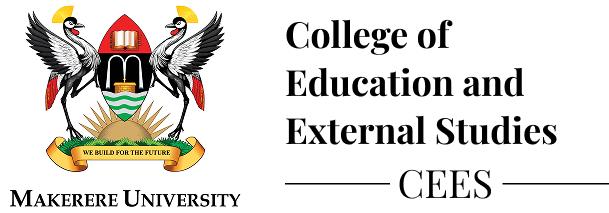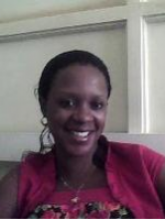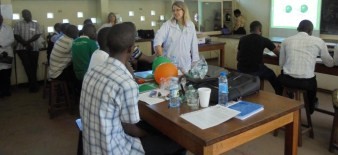Over 30 students and staff participated in a dissemination seminar on the development of an Education for Sustainable Development (ESD) Curriculum in the School of Education on 29 March 2012. The seminar organised by Dr Victoria Kaggwa Tamale from DFC and Dr Mathias Bwanika from DHLE, aimed to disseminate the findings of an audit carried out on the status of ESD in the School of Education.
Participants were treated to a series of excellent presentations centred around ESD by guests and School of Education staff on mainstreaming ESD at Makerere University, the Uganda Martyrs University experience on mainstreaming ESD and ESD in the African context.
Speakers included International Training Programme ESD Regional Coordinator and lecturer at Rhodes University Ms Amanda Hlengwa, NEMA Environment Education and Public Awareness Coordinator, Dr Daniel Babikwa, Br Byaruhanga Aloysius from Uganda Martyrs University Nkozi, Dr Victoria Kaggwa Tamale and Dr Mathias Mulumba Bwanika from the School of Education.
In his opening remarks on behalf of the Dean SOE, Dr Muhammad Kiggundu welcomed participants and noted that education is a starting point and all development should be done through education. He said, “the School of Education has been given an opportunity to build ESD and we are glad that the speakers will share what they have learned and pass on this information to our teacher trainees.
Education for Sustainable Development is a concept that goes beyond environment education. It is an educational process of achieving human development through economic growth, social development and environmental protection in an inclusive, equitable and secure manner. The study, conducted in the four departments of the SOE, found that SOE had average scores in the teaching cluster and very low in community engagement with all scores below 50%. The teaching content had elements of ESD but these were not tackled in an ESD manner and emphasis was not put on such aspects. One issue noted was that lecturers tended to stick to the course outline and found it difficult to integrate other aspects outside the curriculum. Community engagement including sustainable community projects were non existent.
Some of areas the SOE is integrating ESD include incorporating ESD in the course ‘EDA 1201: Theories and practice of educational administration and management’, awareness raising seminars for the University community, designing courses in ESD such as certificate, Postgraduate Diploma in Education and Masters courses, development of critical and creative thinking and integrated problem solving skills among students, community engagement projects such as waste management at SOE and in the surrounding communities.
In his presentation, Dr Daniel Babikwa said, “Uganda has a fragile environment and we are already experiencing climate change and environment degradation issues such the Palm oil industry in Kalanaga which has destroyed forests and whose pesticides have contaminated the water and led to the delivery of blue babies, dry riverbeds and stream across the country.” He questioned the sustainability of economic development projects whose aim is a genuine desire to increase per capita income but at what cost. He illustrated how in recent times fishing was promoted over coffee growing and how this over fishing had depleted fish stocks in Uganda’s waters. He called for the University to make a contribution to ESD since it is in a privileged position to offer intellectual guidance to the nation.
Br Byaruhanga informed participants that ESD had been incorporated into the Uganda Matryrs University strategic plan and embedded in the revised University charter. Student leaders and staf had received capacity development in ESD. The MA Education, BSc Organic Agriculture and MSc Agroecology had incorporated ESD in their courses. Student initiatives included a project on managing plastic waste wisely and gathering inorganic products to clean the environment. He also informed participants that collaborations had been established and plans were underway to set up a greater Masaka Regional Centre of Expertise.
Ms Amanda Hlengwa noted that Africa had lessons to learn from developed countries regarding effects of development on the environment and what these countries were doing to counteract these effects. She noted the need for active and participatory approaches to learning and encouraged universities to appreciate this holistic form of learning. She also called for a multidisciplinary approach to ESD at universities.
While closing the seminar, Prof JCS Musaazi, Principal CEES said that ESD introduces a focus on values, ethics and on new challenges for multi disciplinary and inter disciplinary dialogue, teaching and research. He noted that ESD encourages universities to enhance their role in shaping society, society’s future and in seeking solutions to Africa’s environmental and developmental challenges. Since ESD is multidisciplinary and multi-sector all university disciplines have a role to play in addressing sustainable development challenges in Africa.
The seminar was concluded with a tree planting activity by the Principal CEES and participants at the Department of Foundations and Curriculum Studies.



